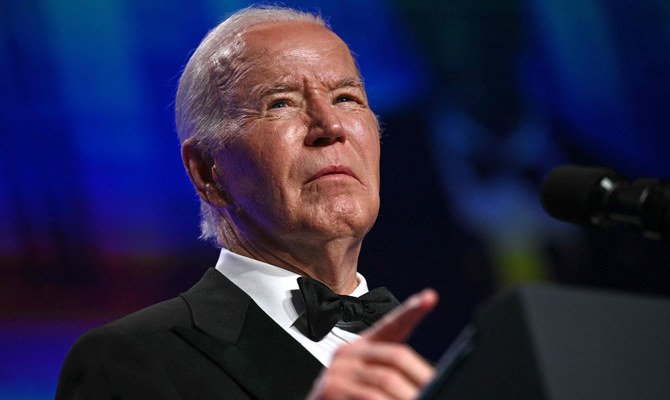
In his first address to the UN since he became US president, Joe Biden proudly said that for the first time in 20 years America was no longer at war, trying somehow to justify the Afghanistan withdrawal that attracted a lot of criticism. The pullout was symbolic for a new US administration that no longer focuses on this region and is instead focused on great power competition with Russia and China, as well as on climate change.
Though Biden says he is ending the era of “relentless war” and starting the era of “relentless diplomacy,” his administration’s approach seems to be more “kicking the can down the road.” He avoids drastic decisions and tries instead to maintain the status quo and avoid a major blunder with the lowest cost possible.
The main objective is to avoid confrontation, even if this leads to accommodating or accepting, to a certain extent, some unsavory actors. The administration wants to avoid the collapse of Syria and Lebanon. In Lebanon, facing Hezbollah leader Hassan Nasrallah’s defiance, the US accepted a deal that aims to transport gas from Egypt to Lebanon via Jordan and Syria. This means Bashar Assad will also get his share of gas. Added to that, the pipeline will give Assad a certain value.
The US will be concerned about the stability of the area through which the gas pipeline passes, as it wants to make sure there is no interruption of supply. This policy is that of the status quo, which can mean accepting mediocrity in order to avoid what might be worse. The Biden administration will not normalize relations with Assad or publicly accept him as the winner of the Syrian conflict, but at the same time it will make no effort to remove him from power. In the space between, it will try to focus on the humanitarian arena, as long it is at a reasonable cost. In order to prevent a collapse of the country, the White House might be willing to give the regime space to breathe.
The future of the US presence in Syria is being debated. A Democratic representative from New York has introduced a legislative amendment that would require the US to withdraw from Syria and transfer the security of the northeast of the country to the Syrian Democratic Forces. The future of the American presence in Iraq is also uncertain, dependent on whether the Iraqi elections result in an anti-US government, and a possible request for it to leave.
The US is now trying to craft different deals to ensure that a potential departure from Syria will not create a void. As a consequence of its departure from the northeast, the US administration may tolerate a deal between the regime and the SDF. The motto of the current administration seems to be “the least headache possible” — to leave those long-lasting conflicts and put in place deals that will ensure a minimum of stability.
While the Trump White House wanted the regime to collapse, or at least near-collapse, to instigate change, the current administration prefers the status quo as the repercussions of the government falling may be hard to manage. However, such a policy may not be feasible as it could create more chaos than stability.
Dr. Dania Koleilat Khatib
Today, the debate on Syria is between two camps: One says that the current light footprint of the American presence is low cost and sustainable, while the other asks what the US departure date is and insists it would be better to make the necessary arrangements and leave. If the latter camp wins, what kind of arrangements would the US put in place and could they be sustained if there were no one to guarantee them?
Though the current policy is not clear — unlike under Donald Trump — Biden seems to be releasing the pressure on the Syrian regime. While the Trump White House wanted the regime to collapse, or at least near-collapse, to instigate change, the current administration prefers the status quo as the repercussions of the government falling may be hard to manage. However, such a policy may not be feasible as it could create more chaos than stability.
If we take a look at Afghanistan, the US only had about 2,500 troops left there and no soldier had died in combat in the 18 months before the Daesh attack during the withdrawal. So the cost of the US presence was low and, regardless of what we think of the Western-imposed government, the American goal was to hinder the Taliban and other terrorist organizations and to keep the government in place. Those goals were more or less being met at a reasonable cost.
With the withdrawal, the potential cost in terms of terrorist attacks is now much higher. The same would apply to Syria. The current cost is low, but a US withdrawal might bring about confrontations between Turkish and Kurdish forces, and between the regime and the Kurds, or even a potential deal. However, if a deal is struck with the SDF, does the West want Assad to have control over Al-Hol camp, which houses 70,000 people, including a large number of extremists? They may be an important reservoir of terrorists that Assad could skillfully use to blackmail the world and, of course, gain false legitimacy. After all, didn’t he — through the amnesty of 2013 — unleash many terrorists and extremists who slaughtered Christians in the town of Maaloula? The regime’s recapture of this town helped Assad position himself as the dictator who protects minorities.
The Biden administration should thoroughly think through this policy of kicking the can down the road, as putting off drastic decisions could be a disaster in the making.
• Dr. Dania Koleilat Khatib is a specialist in US-Arab relations with a focus on lobbying. She is co-founder of the Research Center for Cooperation and Peace Building, a Lebanese NGO focused on Track II. She is also an affiliate scholar with the Issam Fares Institute for Public Policy and International Affairs at the American University of Beirut.
Disclaimer: Views expressed by writers in this section are their own and do not necessarily reflect Arab News" point-of-view












